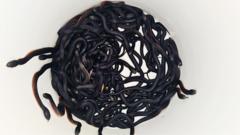An in-depth examination by Australian mathematicians concludes that even with infinite time, monkeys cannot reproduce Shakespeare’s works, challenging the infinite monkey theorem long used in probability discussions.
Monkeys Typing Shakespeare: A Mathematical Debunking

Monkeys Typing Shakespeare: A Mathematical Debunking
A new study reveals that the old adage about monkeys writing Shakespeare is misleading, debunking the infinite monkey theorem.
Despite engaging in long-standing discussions on randomness and probability, the infinite monkey theorem has been placed under scrutiny by two mathematicians from Australia. Stephen Woodcock and Jay Falletta, based in Sydney, conducted a peer-reviewed study exploring just how likely it is for a monkey randomly pressing keys to ever replicate the vast body of work produced by William Shakespeare.
The mathematicians found that the timeframe required for a monkey to type out all of Shakespeare's plays, sonnets, and poems exceeds the age of our universe. Thus, while the theorem holds a certain mathematical truth, its implications are somewhat misleading, signaling a departure from its commonly accepted interpretations.
In an interesting twist, the researchers extended their analysis beyond just one typing monkey, factoring in the entire global population of chimpanzees—about 200,000. Their results revealed that even if every chimpanzee in existence typed one character per second until the end of time, they would fall drastically short of recreating Shakespeare’s oeuvre. In fact, a chimp has only a 5% chance of typing the word “bananas” in a lifetime, and the probabilistic odds of forming a coherent sentence like “I chimp, therefore I am” stand at one in 10 million billion billion.
The study asserts that even with improvements in typing speeds or increased populations, the idea of monkeys generating significant literary works is not a viable proposition. In shaping their conclusions, the researchers employed calculations rooted in the heat death theory—currently the most accepted hypothesis regarding the eventual fate of our universe. This concept suggests that as the universe expands, it will cool and eventually lead to a state where all energy is dispersed, rendering it inhospitable for any form of life.
“Such outcomes place the infinite monkey theorem alongside other probability riddles, where infinite resources yield results that clash with our universe’s limitations,” stated Associate Prof Woodcock. With their findings, Woodcock and Falletta invite a reassessment of mathematical conjectures that assume any unlimited resource can lead to positive outcomes in practical scenarios.
The mathematicians found that the timeframe required for a monkey to type out all of Shakespeare's plays, sonnets, and poems exceeds the age of our universe. Thus, while the theorem holds a certain mathematical truth, its implications are somewhat misleading, signaling a departure from its commonly accepted interpretations.
In an interesting twist, the researchers extended their analysis beyond just one typing monkey, factoring in the entire global population of chimpanzees—about 200,000. Their results revealed that even if every chimpanzee in existence typed one character per second until the end of time, they would fall drastically short of recreating Shakespeare’s oeuvre. In fact, a chimp has only a 5% chance of typing the word “bananas” in a lifetime, and the probabilistic odds of forming a coherent sentence like “I chimp, therefore I am” stand at one in 10 million billion billion.
The study asserts that even with improvements in typing speeds or increased populations, the idea of monkeys generating significant literary works is not a viable proposition. In shaping their conclusions, the researchers employed calculations rooted in the heat death theory—currently the most accepted hypothesis regarding the eventual fate of our universe. This concept suggests that as the universe expands, it will cool and eventually lead to a state where all energy is dispersed, rendering it inhospitable for any form of life.
“Such outcomes place the infinite monkey theorem alongside other probability riddles, where infinite resources yield results that clash with our universe’s limitations,” stated Associate Prof Woodcock. With their findings, Woodcock and Falletta invite a reassessment of mathematical conjectures that assume any unlimited resource can lead to positive outcomes in practical scenarios.



















